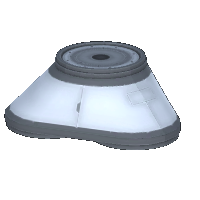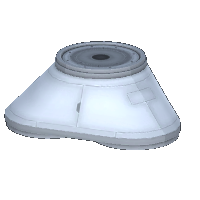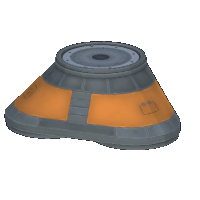Difference between revisions of "TVR-1180C Mk1 Stack Tri-Coupler"
m (moved StackTriCoupler to TVR-1180C Mk1 Stack Tri-Coupler) |
m (Added variants) |
||
| (25 intermediate revisions by 17 users not shown) | |||
| Line 1: | Line 1: | ||
| − | + | {{:TVR-1180C Mk1 Stack Tri-Coupler/Box}} | |
| − | |||
| − | |||
| − | |||
| − | |||
| − | |||
| − | |||
| − | |||
| − | |||
| − | |||
| + | The '''TVR-1180C Mk1 Stack Tri-Coupler''' is an adapter that allows for a single rocket to branch into 3 separate stacks. | ||
| − | + | == Usage == | |
| − | + | All nodes on the TVR-1180C are 1.25 meters (small). As with all adapters, [[liquid fuel]] will flow through it. Despite the similar name, the TVR-1180C is not a [[decoupler]]; it does not jettison anything nor does it add a stage to the rocket. It branches into 3 separate stacks, but they are unsupported and prone to bending or breaking if the weight and thrust are not properly distributed. Rockets incorporating a tri-coupler are also likely to [[Wobbling|wobble]], unless the stacks are opportunely bound together with [[EAS-4 Strut Connector]]s. The tricoupler is also subtly asymmetrical, so rockets must have control options to correct for induced pitch, yaw, and/or roll. The tricoupler has non-standard (0.3 instead of 0.2) drag, meaning it should be placed behind the center of mass. | |
| − | |||
| − | |||
| − | + | Another, unconventional use of this part is as a landing 'foot' - when landing very large craft (such as bases), the stock landing legs aren't big or powerful - using the strut parts as 'legs' and the tricoupler as a 'foot', you can artificially make your own landing leg! | |
| − | |||
| − | |||
| − | |||
| − | |||
| − | |||
| − | |||
| − | + | == Product description == | |
| − | + | {{Quote | |
| − | + | |The Stack Tricoupler! If your stack is lacking in awesomeness, this is the tool for you! Just remember that this is not a decoupler, and won't separate stages. | |
| − | + | }} | |
| − | |||
| − | |||
| − | + | == Variants == | |
| + | As of {{version|1.6}} this adapter has three textures that can be switched in the editor. | ||
| + | {{multiple image | ||
| + | |align=left | ||
| + | |width=200 | ||
| + | |image1=TVR-1180C_Dark.png | ||
| + | |alt1=Dark variant | ||
| + | |image2=TVR-1180C_White.png | ||
| + | |alt2=White variant | ||
| + | |image3=TVR-1180C_Orange.png | ||
| + | |alt3=Orange variant | ||
| + | |footer=The different variants of the adapter | ||
| + | }} | ||
| + | {{clear|left}} | ||
| − | + | == Changes == | |
| − | + | ;[[1.6]] | |
| − | + | * New model and texture | |
| − | + | * Added 3 variants | |
| − | + | ;[[0.18]] | |
| − | + | * New model and texture | |
| − | + | ;[[0.16]] | |
| + | * Mass reduced from 0.8 to 0.3 (part rebalancing) | ||
| + | ;[[0.15]] | ||
| + | * (Undocumented part of fuel flow changes) added NoCrossFeedNodeKey = bottom (keeps fuel from flowing FROM the bottom nodes to prevent stack imbalances and such) | ||
| + | ;[[0.8.5]] | ||
| + | * Replaced tricoupler textures and UV mapping (UV map by Dippeggs) | ||
| + | ;[[0.8.1]] | ||
| + | * Fuel can now flow through Strut parts like the tricoupler | ||
| + | ;[[0.8]] | ||
| + | * (Bug fix) VAB placement bug with tricouplers and fuel tanks (and decouplers) | ||
| + | ;[[0.7.3]] | ||
| + | * Initial Release | ||
| − | + | {{Parts}} | |
| − | + | [[Category:Adapters]] | |
| − | |||
| − | |||
| − | |||
| − | |||
| − | |||
| − | |||
| − | |||
| − | |||
| − | |||
| − | |||
| − | |||
| − | |||
| − | |||
Latest revision as of 14:37, 27 December 2018
| TVR-1180C Mk1 Stack Tri-Coupler | ||
| Adapter by O.M.B. Demolition Enterprises | ||
| Radial size | Small | |
| Cost | (total) | 680.00 |
| Mass | (total) | 0.150 t |
| Drag | 0.3 | |
| Max. Temp. | 2000 K | |
| Impact Tolerance | 12 m/s | |
| Research | | |
| Unlock cost | 2 100 | |
| Since version | 0.7.3 | |
| Part configuration | stackTriCoupler_v2.cfg | |
| Packed volume | None | |
The TVR-1180C Mk1 Stack Tri-Coupler is an adapter that allows for a single rocket to branch into 3 separate stacks.
Contents
Usage
All nodes on the TVR-1180C are 1.25 meters (small). As with all adapters, liquid fuel will flow through it. Despite the similar name, the TVR-1180C is not a decoupler; it does not jettison anything nor does it add a stage to the rocket. It branches into 3 separate stacks, but they are unsupported and prone to bending or breaking if the weight and thrust are not properly distributed. Rockets incorporating a tri-coupler are also likely to wobble, unless the stacks are opportunely bound together with EAS-4 Strut Connectors. The tricoupler is also subtly asymmetrical, so rockets must have control options to correct for induced pitch, yaw, and/or roll. The tricoupler has non-standard (0.3 instead of 0.2) drag, meaning it should be placed behind the center of mass.
Another, unconventional use of this part is as a landing 'foot' - when landing very large craft (such as bases), the stock landing legs aren't big or powerful - using the strut parts as 'legs' and the tricoupler as a 'foot', you can artificially make your own landing leg!
Product description
| “ | The Stack Tricoupler! If your stack is lacking in awesomeness, this is the tool for you! Just remember that this is not a decoupler, and won't separate stages. | ” |
Variants
As of version 1.6 this adapter has three textures that can be switched in the editor.
Changes
- New model and texture
- Added 3 variants
- New model and texture
- Mass reduced from 0.8 to 0.3 (part rebalancing)
- (Undocumented part of fuel flow changes) added NoCrossFeedNodeKey = bottom (keeps fuel from flowing FROM the bottom nodes to prevent stack imbalances and such)
- Replaced tricoupler textures and UV mapping (UV map by Dippeggs)
- Fuel can now flow through Strut parts like the tricoupler
- (Bug fix) VAB placement bug with tricouplers and fuel tanks (and decouplers)
- Initial Release


